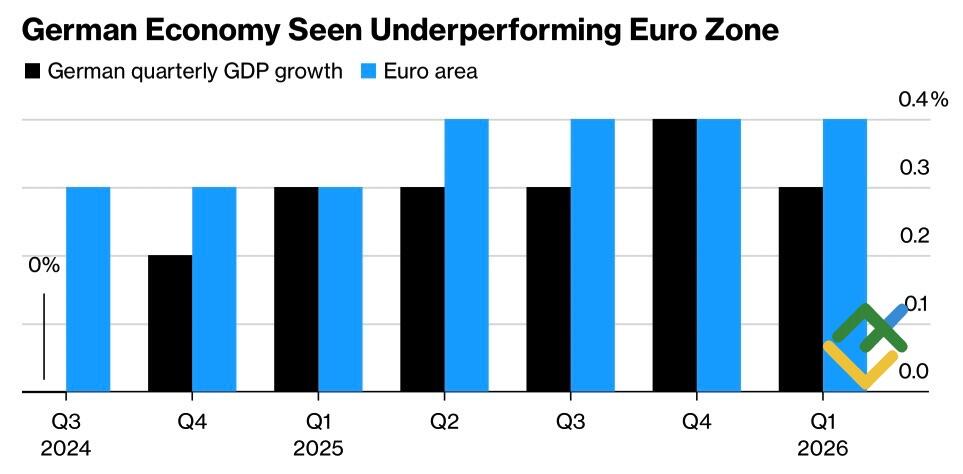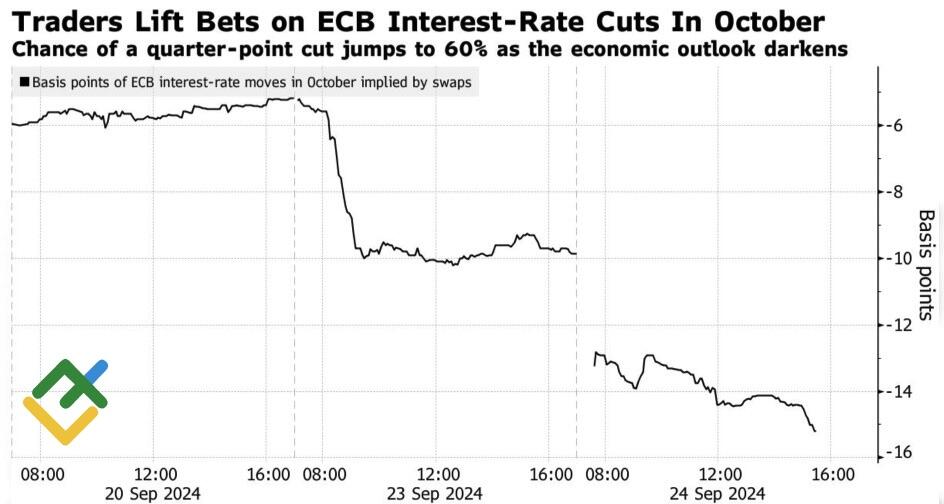
The deceleration in economic growth in the United States and China prompted the Fed and the People’s Bank of China to pursue aggressive monetary policies. The current market conditions are prompting similar demands of the ECB, which is contributing to an increase in global risk appetite and pushing the EURUSD pair higher. Let’s discuss this topic and develop a trading plan.
The article covers the following subjects:
Highlights and key points
- China has announced the most massive stimulus since the pandemic.
- Markets are demanding that the ECB cut rates in October.
- Mass monetary expansion has the potential to boost global GDP.
- The EURUSD pair may rise to 1.13 and 1.143.
Weekly fundamental forecast for euro
The Federal Reserve’s decision to cut rates by 50 basis points in September has had significant ramifications. China was the first to respond with the most significant monetary stimulus since the onset of the pandemic. It appeared as though the People’s Bank of China had been anticipating the Fed’s bold move. If Beijing had taken action before Washington, the yuan could have experienced a significant decline, accelerating capital outflows from the country. However, it rose to a 16-month high against the US dollar, which resulted in an increase in the EURUSD pair.
Timing is everything. The PBoC finally reacted to the slowing economy, lower GDP forecasts from major banks, including Goldman Sachs and UBS, and the growing risks of failing to meet the government’s official target of 5% by the end of 2024. The annual rate was reduced to 2% from 2.3%; the required reserve ratio was cut by 0.5 pp with the possibility of further reductions of 0.25-0.5 pp; a 500 billion yuan fund was established to purchase Chinese equities, and the 7- and 14-day repo rates declined.
These significant measures have the potential to not only stabilize the Chinese economy but also have a positive ripple effect on Germany. According to Joachim Nagel, the president of the Deutsche Bundesbank, the economy will begin to recover gradually as the causes of the GDP slowdown, including high inflation and interest rates, are addressed. China’s challenges are expected to be temporary. The recent data on business activity and business climate from IFO, which indicated an imminent recession, has given way to unexpected optimism.
German and euro area GDP
Source: Bloomberg.
A Reuters source revealed that major economic institutions have revised their forecast for German GDP growth in the third quarter to 0.1%, indicating the possibility of another technical recession. The currency bloc’s largest economy is urging the ECB to adopt a more proactive stance. The derivatives market suggests a 60% probability of a 25 bp cut in the deposit rate to 3.25% in October.
Market expectations on ECB interest rate
Source: Bloomberg.
Investors are calling on the European Central Bank to adopt a similarly decisive approach to that of the Fed and the People’s Bank of China. To avoid repeating the mistake of 2021, the ECB must take a proactive approach rather than simply following the data. In the past, the Governing Council delayed taking action for too long, allowing inflation to spiral out of control.
In theory, the ECB’s actions should cause the EURUSD pair to decline. However, markets are still awaiting further monetary easing from the Fed. In addition, significant rate cuts are boosting global risk appetite and confidence in the acceleration of the global economy. Procyclical currencies, including the euro, will benefit the most from this.
Weekly trading plan for EURUSD
The expectation of a bright future is driving the EURUSD pair higher. Long trades formed at 1.108-1.11 after the European PMI data arrived, and long positions were also initiated at 1.1145. It is better to keep them open and form new ones over time. The initial targets are 1.13 and 1.143.
Price chart of EURUSD in real time mode
The content of this article reflects the author’s opinion and does not necessarily reflect the official position of LiteFinance. The material published on this page is provided for informational purposes only and should not be considered as the provision of investment advice for the purposes of Directive 2004/39/EC.
{{value}} ( {{count}} {{title}} )
This post is originally published on LITEFINANCE.





